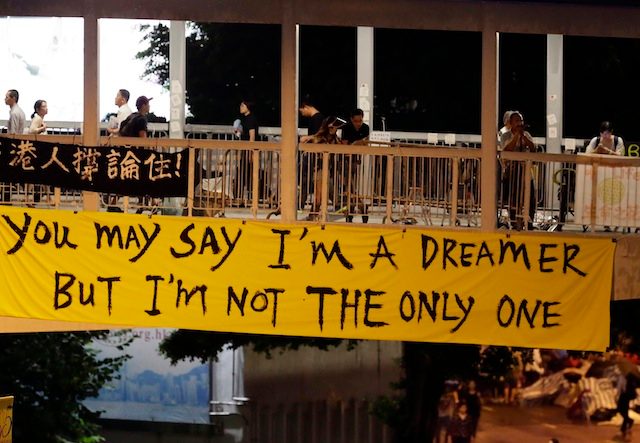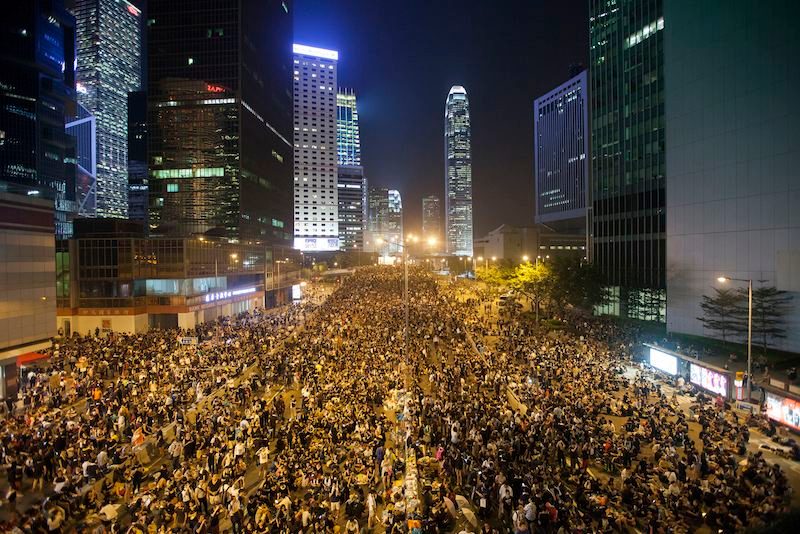SUMMARY
This is AI generated summarization, which may have errors. For context, always refer to the full article.

HONG KONG – I’ve often regarded Hong Kong as the itchy nether region of China: in small ways dodging Beijing’s grip, and giving the Communist Party much to scratch its head about.
Linked to its wealth, international standing and status as a special administrative region, Hong Kong enjoys a higher degree of freedom than mainland China: a free press, freedom to assemble, a free market, and an internet where you don’t have to play hide and seek with censors.
So it’s easy to fall for the illusion that all is “democratic” in Hong Kong – until I asked a lawyer once, about better protection for Filipino domestic helpers, why the people can’t pressure the government into changing policies. “But this is not a democratic government,” he pointed out. I had to sheepishly admit I thought it was.
In this bubble of relative freedom, Hongkongers have an activist streak and in the three years I’ve worked here, there’s been a fair share of demonstrations. Thousands come to the vigil to mark the July 1, 1989, Tiananmen massacre each year (when mainland China typically slips into amnesia – and forces its denizens to do the same, through detentions of activists and internet censorship). Hong Kong has also seen pro-Snowden rallies and the local version of “Occupy Wall Street”, when that idea caught traction around the world.
Hong Kong does have wide economic disparities – with a Lamborghini-owning, Chanel-toting upper crust on one end and the impoverished workers living in coffin-sized apartments called “cage homes” in the other, because rents and the cost of living are too high.
“It was also interesting to see the unique Hong Kong quality to the Occupy protests, how sedate and non-chaotic it is compared to what I know of rallies in the Philippines.”
So I wasn’t so shocked when a group of Hongkongers, dubbed Occupy Central, decided to protest against corporate greed and economic inequality by camping out in tents on the ground floor of the HSBC building, in the financial district Central, for 11 months.
But that campaign fizzled out in the end, and the bankers got their lobby back, and Occupy Central didn’t figure in the public consciousness much – until the issue of 2017 universal suffrage gained steam this year and the group became a clear, insistent pro-democracy voice.
With a British past and Chinese present, Hong Kong has had an identity crisis. In the months leading up to the recent protests, you did sense an opposition to mainland China brewing (scuffles with mainland tourists peeing in public; criticism of politicians seen as pro-Beijing; policies to prevent mainlanders from giving birth or hoarding baby milk powder bought in Hong Kong; and the weeks-long student protests against a nationalist curriculum that was perceived as being uncritical of China).
But I didn’t think that the Hong Kong activist streak would rear its head so angrily – and resiliently – as it did when the Communist Party said “No” to genuine universal suffrage. In response, students boycotted classes, and shortly after, Occupy Central kicked off its “civil disobedience” movement at 2 am last Sunday, September 28.
It seemed like the discontent against Beijing’s rule had bubbled over and Hong Kong wanted suffrage to be that wedge demarcating from communist China.
Many, like me, were probably busy nursing a hangover or sleepily rubbing their eyes when the reality and enormity of the protests set in that morning. The protesters – mostly students and young professionals – surrounded the government’s headquarters in Admiralty, on Hong Kong island, and by evening, the crowds swelled to tens of thousands, packing surrounding streets, carving out new protest zones.
As a Filipino, I felt affinity to the movement, especially when they adopted yellow ribbons as a protest symbol – reminiscent of the People Power Revolution, also to revive a democracy that withered and died under a dictatorship.
But it was also interesting to see the unique Hong Kong quality to the Occupy protests, how sedate and non-chaotic it is compared to what I know of rallies in the Philippines.
Many fellow foreigners, watching from the sidelines or sometimes visiting Occupy zones and talking to protesters and giving their silent support (“It’s history in the making”), were impressed by how peaceful and polite these activists are.
They’ve shown restraint in the face of police tear-gas attacks; studiously cleaning up their messes in the streets; say “sorry” to the public (for the inconvenience) in their protest banners; and as far as I can tell they lack that bitter cynicism about how effective a people’s movement would be in effecting fundamental change. Such maturity bodes well for their political future.

It’s so far apparent that Beijing is leaving it up to Hong Kong leader Leung Chun-ying to let this problem go away. Leung, no matter the offer of negotiations, seems unwilling to bend to the protesters’ demands for him to step down and to change its answer on election reform. Both look like they’re waiting for the protests to drag on so long that they turn into a public nuisance, such that other citizens shoo them away on their own. Indeed, in a city where money is king, any prolonged interruption to business is bound to cause trouble.
It feels to me that it’s through an exponential increase in protester numbers that Leung’s administration, and Beijing, would be forced to give a concession (sacking Leung’s number 2 or 3 official, for instance) or a compromise. But while for now it looks like the public’s sympathy is with the protesters, it’s hard to tell what the rest of the city thinks.
When I walk in areas beyond the protest zones, you get the feeling it’s business as usual, and many people care to stay tuned to the Occupy movement in the news – but not enough to abandon their work, their classes or the normalcy of their lives to dust off the umbrellas and join the hordes to fight for a genuinely democratic Hong Kong.
Perhaps it’s that illusion of democracy that works against it: “We have all these freedoms anyway, what more can we ask?”
“Whatever the outcome, the hopeful image in my mind is of Hong Kong’s democracy protesters with raised fists, not in surrender, but peaceful defiance.”
I think it would help – and this is what Filipino activists are good at when mobilizing the masses – for Occupy protest leaders to give a sharper message of how having a hand in choosing one’s leaders can help improve people’s lives. They can bring it down to gut issues like how political change could affect high housing prices and rents, social welfare, or labor policies, or what stake foreign workers/residents like me have in this battle.
I’m interested to see how this protest movement would challenge China’s ascendancy, and inspire other territories living under a higher power’s rule. It’s a chance to assert how a truly free society is better than a caged, tightly controlled one.
From where I’m standing, close to home on Gloucester Road in Wan Chai, it’s hard to tell from the streams of weary youths in black T-shirts pinned with yellow ribbons going home each night, resting for another day’s battle tomorrow, how long this movement will last and what change it will bring. Who knows, it could go the way of the Philippines where one regime ends but you’re never sure if what replaces it will be everything it promised or people dreamed.
Whatever the outcome, the hopeful image in my mind is of Hong Kong’s democracy protesters with raised fists, not in surrender, but peaceful defiance. – Rappler.com
The author is a Filipino writer based in Hong Kong.
Add a comment
How does this make you feel?
There are no comments yet. Add your comment to start the conversation.